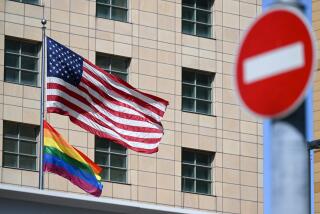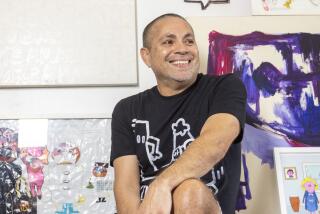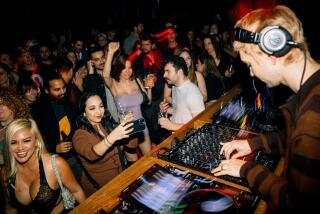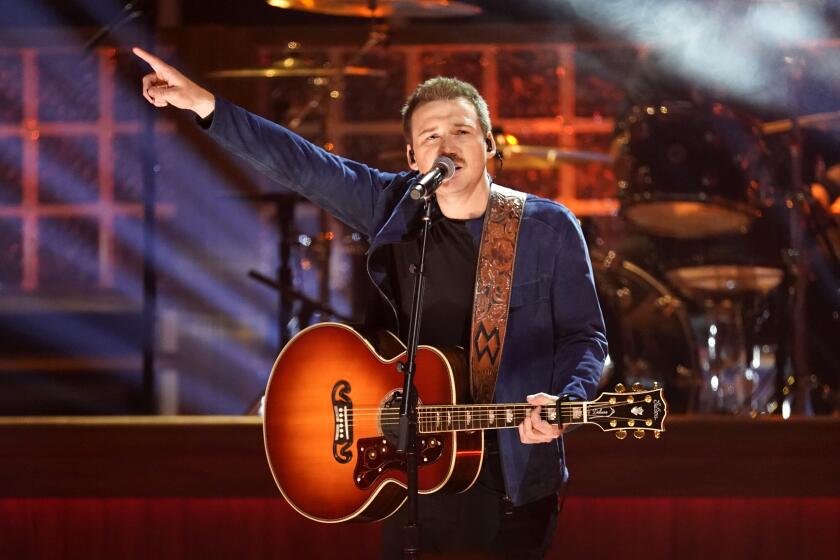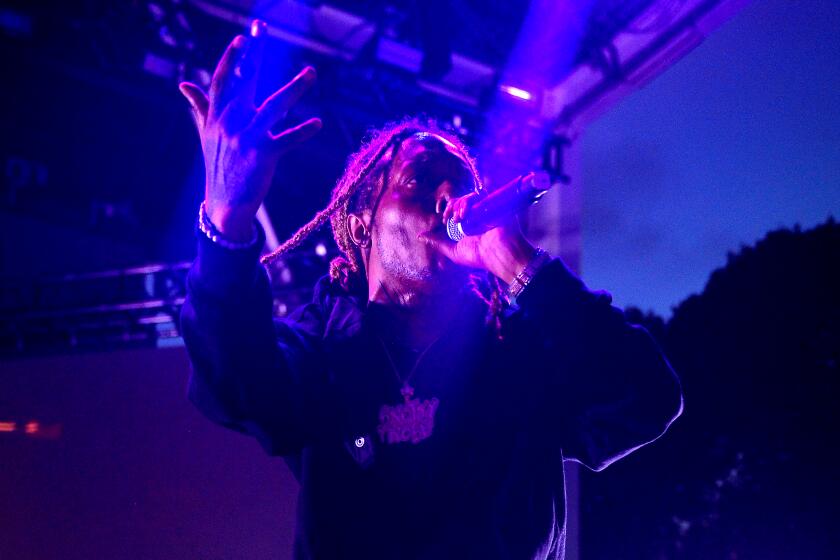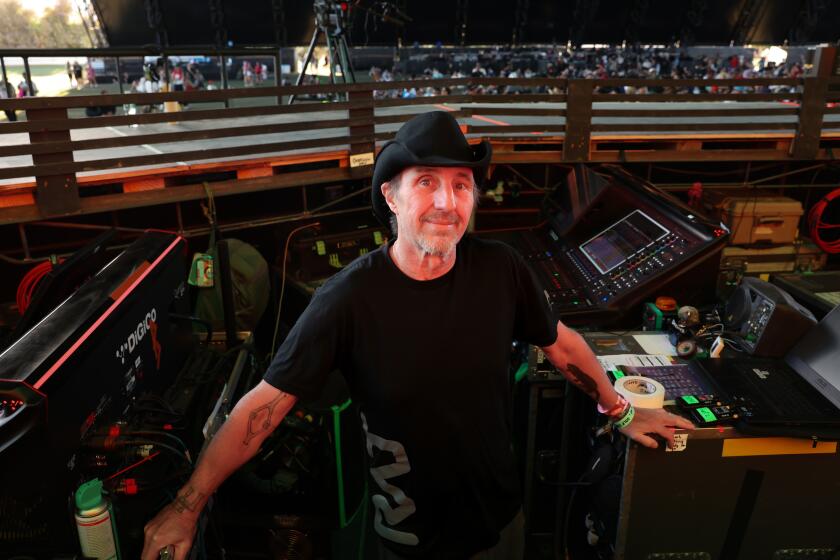Lebanese band Mashrou’ Leila tackles homophobia, Islamophobia on U.S. tour
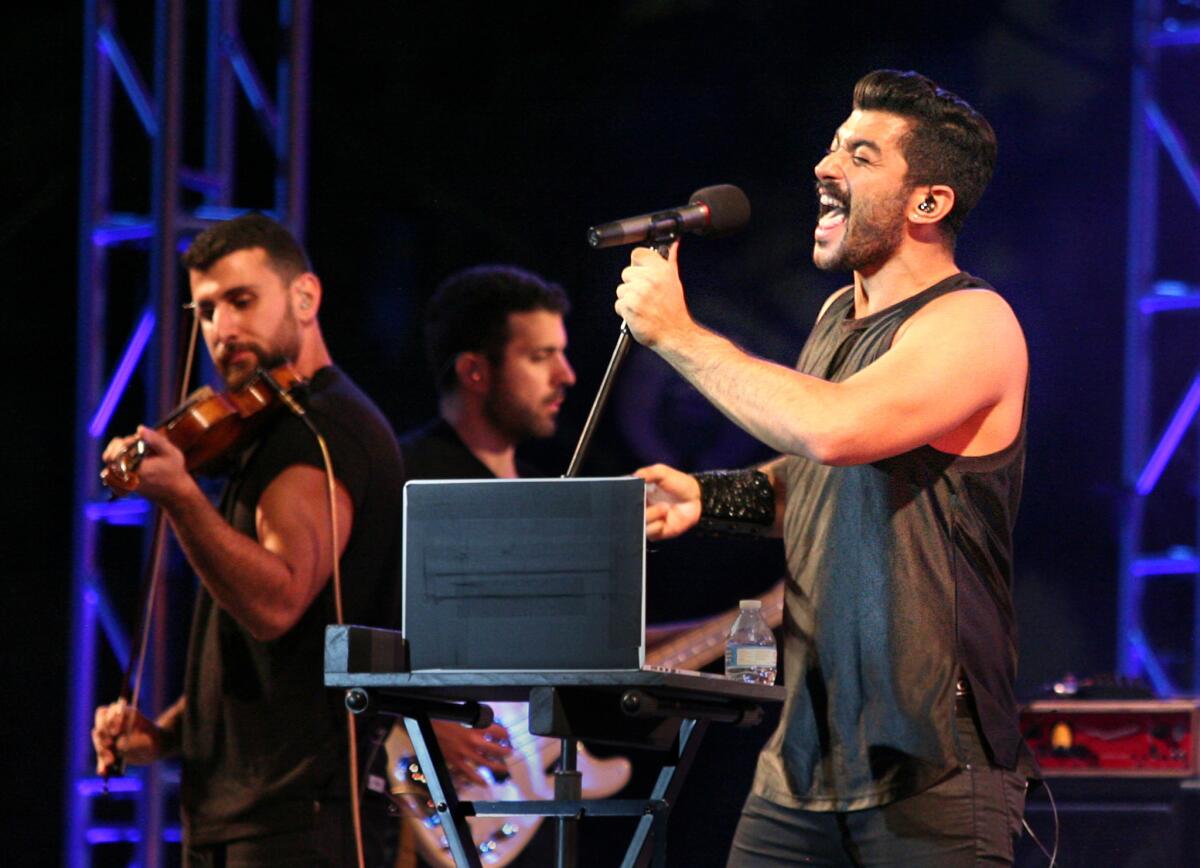
Two weeks into his band’s second U.S. tour, Mashrou’ Leila frontman Hamed Sinno is still in disbelief that the group is here at all, let alone drawing packed houses.
“It doesn’t make sense to me, to be completely honest,” Sinno said Friday as the band set up for a concert at California Plaza in downtown Los Angeles, part of the Grand Performances free summer concert series.
There are multiple reasons he feared a less-than-welcoming reception for his topical band.
“Because of the language barrier, because essentially I’m at the cusp of everything that is hated by America: I’m brown I’m Muslim, I’m queer. That’s as bad as it gets.”
Mashrou’ Leila is a Lebanese indie rock band formed in 2008 by a group of architecture and design students in Beirut. The group had already drawn international attention before this tour, both for its musical style – alternative rock sung in Arabic, driven by violin strains and Sinno’s emotive voice – and for the fact that it is a rarity in the Arab world: a popular group with an openly gay lead singer.
That identity has sometimes led to backlash. The group has been threatened on social media and banned from playing in Jordan. But it hasn’t prevented the act from building an enthusiastic following, in the Middle East, among young people hungry for an Arabic-language alternative to saccharine radio pop, and increasingly abroad.
Recently, it’s also thrust Sinno, and Mashrou’ Leila, into the role of spokespeople.
A week into its U.S. tour, the deadliest mass shooting in modern American history unfolded at a gay nightclub in Orlando, Fla., carried out by a man who claimed allegiance to the terrorist group Islamic State.
Suddenly, Sinno – who was born in the United States and raised in Lebanon -- found himself being called upon to comment on behalf of the Muslim and gay communities.
“What a time to be an Arab American queer Muslim,” he posted on Twitter. “My heart is with the families of the victims. I wish you strength and clarity.”
Sinno said his initial shock on hearing the news was “rapidly substituted with being afraid that the assailant would have any sort of connection to Islam or the Arab world” and that the attack would drive a wedge between people like him and the rest of the LGBT community.
“It’s a second assault, in the sense where we’re robbed of each other,” he said.
Adding to the eerie timeliness of the tour is the fact that much of Mashrou’ Leila’s latest album, “Ibn el Leil,” or “son of the night,” takes place in nightclubs. Two of the songs address violent incidents taking place within their confines.
“Maghawir” uses the story of a shooting at a nightclub to critique hyper-masculinity, and “Tayf” tells of a police raid on a gay club in a Beirut suburb.
The inspiration for the album was intimately personal, Sinno said. It was written in the aftermath of his father’s death.
“I guess I just took to various escapisms, including a very intense nightlife for a while, and so the entire album is really about mourning inside nightclubs,” he said.
But in the wake of the attack in the Orlando gay club, what had been personal suddenly became political.
“For the queer community, you sort of grow up feeling like all the spaces around you treat you like a monster and then the first time you walk into a gay bar or club, you kind of just feel like you’re with the rest of the circus and you’re in company that will shelter you,” Sinno said. “All of our camaraderies are forged in clubs.”
As the sun sank over the courtyard at California Plaza on Friday, Sinno called for a moment of silence for the Orlando victims before launching into “Kalam,” or “Talk,” a pensive meditation on language, gender and nationalism.
“They wrote the country’s borders (upon my body; upon your body),” he sang. “...Your body conjugates / Your language separates.”
Stage lights danced off the water in the courtyard while a crowd of dancers swayed and bobbed. Zana Hundal and Jad Bitar, a pair of cousins and first-generation Lebanese immigrants living in Burbank, unfurled a Lebanese flag.
As the cousins made their way through a gaggle of exuberant fans after the show, Bitar, 19, explained what drew them to Mashrou’ Leila.
For Lebanese Americans, he said, “It’s rare when you find something that’s part of your culture but also alternative.”
Leigh Ann Hahn, director of programming for Grand Performances, said that crossover appeal was part of the reason she resolved to bring Mashrou’ Leila to the summer concert series after seeing the group play at a festival in Morocco in 2014.
Grand Performances, now in its 30th year, showcases local and international acts.
Hahn said Mashrou’ Leila’s arrival in Los Angeles in the aftermath of the Orlando shootings is “a sad moment, but it’s a really powerful moment for community to gather and to know that these artists exist.”
“Yes, they are here in the United States at a very specific moment in time, but their value as artists transcends just this moment,” she said. “And it’s just great music.”
Twitter: @sewella
More to Read
The biggest entertainment stories
Get our big stories about Hollywood, film, television, music, arts, culture and more right in your inbox as soon as they publish.
You may occasionally receive promotional content from the Los Angeles Times.
